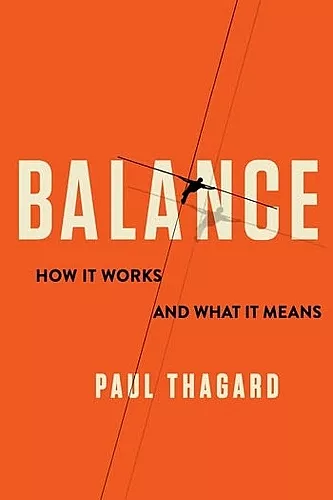Balance
How It Works and What It Means
Format:Hardback
Publisher:Columbia University Press
Published:27th Jul '22
Should be back in stock very soon

Living is a balancing act. Ordinary activities like walking, running, or riding a bike require the brain to keep the body in balance. A dancer’s poised elegance and a tightrope walker’s breathtaking performance are feats of balance. Language abounds with expressions and figures of speech that invoke balance. People fret over work-life balance or try to eat a balanced diet. The concept crops up from politics—checks and balances, the balance of power, balanced budgets—to science, in which ideas of equilibrium are crucial. Why is balance so fundamental, and how do physical and metaphorical balance shed light on each other?
Paul Thagard explores the physiological workings and metaphorical resonance of balance in the brain, the body, and society. He describes the neural mechanisms that keep bodies balanced and explains why their failures can result in nausea, falls, or vertigo. Thagard connects bodily balance with leading ideas in neuroscience, including the nature of consciousness. He analyzes balance metaphors across science, medicine, economics, the arts, and philosophy, showing why some aid understanding but others are misleading or harmful. Thagard contends that balance is ultimately a matter of making sense of the world. In both literal and metaphorical senses, balance is what enables people to solve the puzzles of life by turning sensory signals or an incongruous comparison into a coherent whole.
Bridging philosophy, psychology, and neuroscience, Balance shows how an unheralded concept’s many meanings illuminate the human condition.
From the absolutely literal—how a brain out of balance brings on vertigo—to a dizzying range of metaphors spanning science, medicine, politics, literature, and art, Balance connects it all. The distinguished philosopher Paul Thagard applies his keen analytic skills to sort the all-pervasive metaphors of balance into the strong, the bogus, and the downright toxic. Like a balanced fine wine, Balance is to be enjoyed. -- Keith Holyoak, Distinguished Professor of Psychology, University of California, Los Angeles
Thagard presents a clever juxtaposition of the physical context of balance and a broader insertion of balance as a metaphorical tool, exploring important aspects of science and philosophy alike. Unique, synthetic, and compelling. -- Robert DeSalle, author of Our Senses: An Immersive Experience
From sub-atomics to global warming, neurons to societies, theory to practice—even COVID to consciousness—Balance is satisfyingly vast. Thagard’s polymathic, interdisciplinary, approachable writing produces myriad insights (regarding religion, economics, politics, Trump, tipping points, toxic metaphors, “alternative facts,” etc.). Balance aptly centralizes equilibria (and sometimes helpful imbalances!) within humanity. Integrating even art, emotions, and health (e.g., avoiding falls, anti-vaxxers, and climate change), Balance boosts readers’ intellects. Breezy-yet-deep definitions complement innumerable identity-changing explanations—particularly about how Thagard’s “metabalance” helps reveal life’s meaning. -- Michael A. Ranney, University of California Berkeley
Exceptionally well written, organized and presented for both an academic and non-specialist general readership. * Midwest Book Review *
ISBN: 9780231205580
Dimensions: unknown
Weight: unknown
352 pages